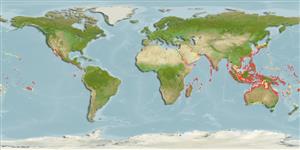Environment: milieu / climate zone / depth range / distribution range
Ekologi
laut berasosiasi dengan karang; kisaran kedalaman 4 - 35 m (Ref. 90102). Tropical
Indo-West Pacific: Red Sea and East Africa to Fiji, north to southern Japan, south to southeast Australia and New Caledonia. Recently recorded from Tonga (Ref. 53797).
Size / Weight / umur
Maturity: Lm ? range ? - ? cm
Max length : 12.0 cm TL jantan/; (Ref. 2334)
Duri punggung (Keseluruhan (total)): 5; duri punggung lunak (Keseluruhan (total)): 17-21; Duri dubur 0; Sirip dubur lunak: 17 - 21; vertebrata, bertulang belakang: 32 - 33. Post-pelagic are almost fully transparent and more slender compared to those established in the benthic phase. Variable in color from black to red and yellow, usually in a mix of bands and spots (Ref. 48635). Total body number of plates 31-35. Caudal fin truncate, rounded or lanceolate. Caudal fins of females modified into brood pouch (Ref. 9829).
Adults usually settle along reef edges in current-prone areas (Ref. 48635). Uncommon species found solitary or paired, among branches of gorgonians, floating weeds, or crinoids (Ref. 9710). They feed mostly on mysids but also target small benthic shrimps (Ref. 48635). Females carry the eggs in their pelvic fins that are modified to form a brood pouch (Ref. 205).
Life cycle and mating behavior
Kematangan | Reproduksi, perkembang biakan | Pemijahan | telur-telur | Fecundity | Larva
Pelvic fins of females are modified as brood pouch for the reception of the eggs (Ref. 205).
Randall, J.E., G.R. Allen and R.C. Steene, 1990. Fishes of the Great Barrier Reef and Coral Sea. University of Hawaii Press, Honolulu, Hawaii. 506 p. (Ref. 2334)
Status IUCN Red List (Ref. 130435)
ancaman kepada manusia
Harmless
penggunaan manusia
Perikanan: tidak ada kepentingan; Akuarium: Akuarium publik
informasi lanjut
AcuanBudidaya airprofil budidaya airStrainGenetikaElectrophoresesDiturunkanPenyakit-penyakitPengolahanNutrientsMass conversion
mitraGambarStamps, Coins Misc.Suara-suaraCiguateraKecepatanTipe renangArea insangOtolithsOtakPenglihatan / visi
Alat, peralatan
laporan khas
muat turun XML
Sumber internet
Estimates based on models
Preferred temperature (Ref.
123201): 20.9 - 29, mean 27.7 °C (based on 626 cells).
Phylogenetic diversity index (Ref.
82804): PD
50 = 0.5312 [Uniqueness, from 0.5 = low to 2.0 = high].
Bayesian length-weight: a=0.01000 (0.00244 - 0.04107), b=3.04 (2.81 - 3.27), in cm total length, based on all LWR estimates for this body shape (Ref.
93245).
Trophic level (Ref.
69278): 3.6 ±0.59 se; based on food items.
Fishing Vulnerability (Ref.
59153): Low vulnerability (10 of 100).
Nutrients (Ref.
124155): Calcium = 129 [75, 249] mg/100g; Iron = 0.917 [0.508, 1.656] mg/100g; Protein = 17.9 [16.7, 19.1] %; Omega3 = 0.123 [0.068, 0.224] g/100g; Selenium = 35.3 [16.7, 82.4] μg/100g; VitaminA = 90.1 [29.4, 266.4] μg/100g; Zinc = 1.93 [1.27, 2.76] mg/100g (wet weight);
